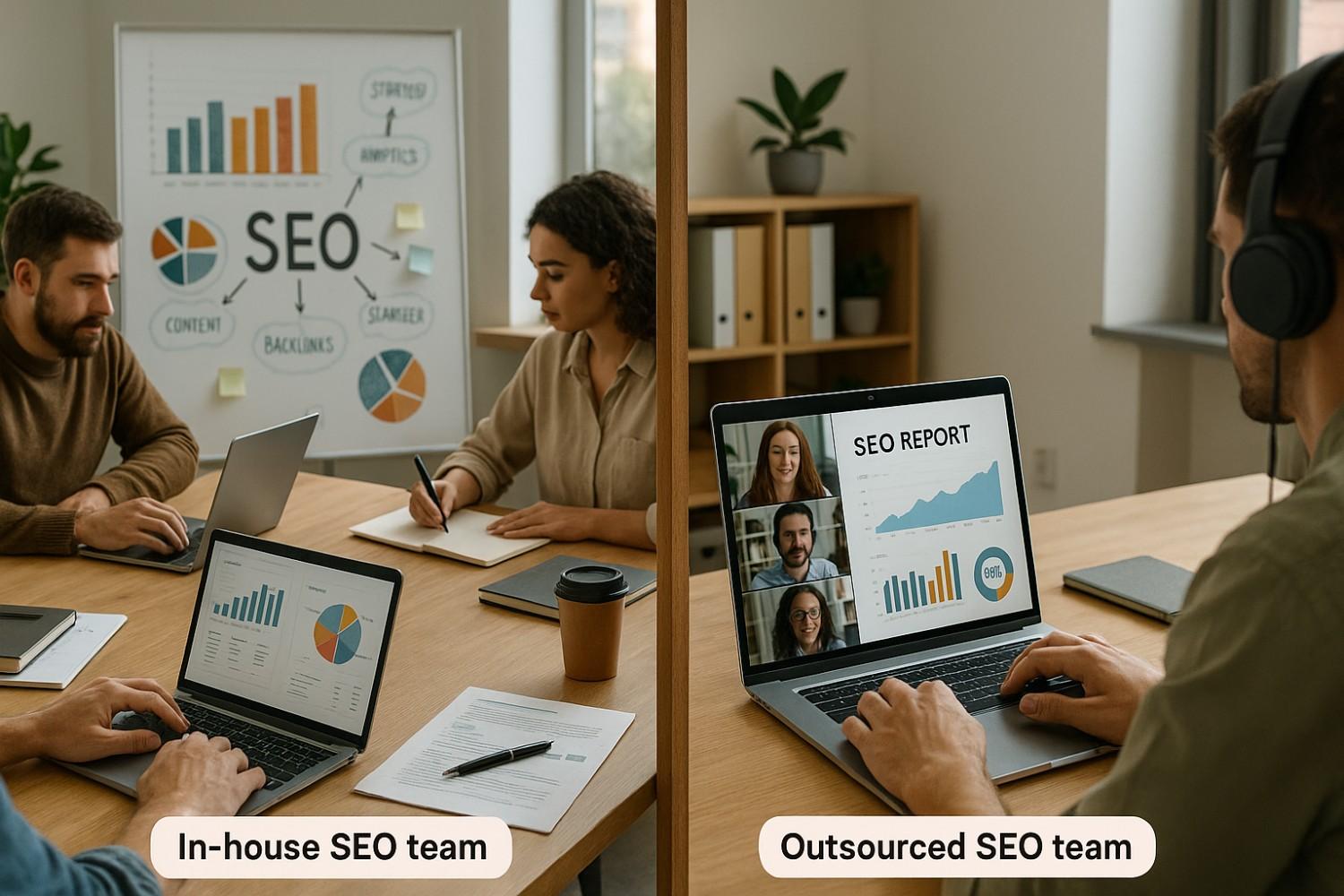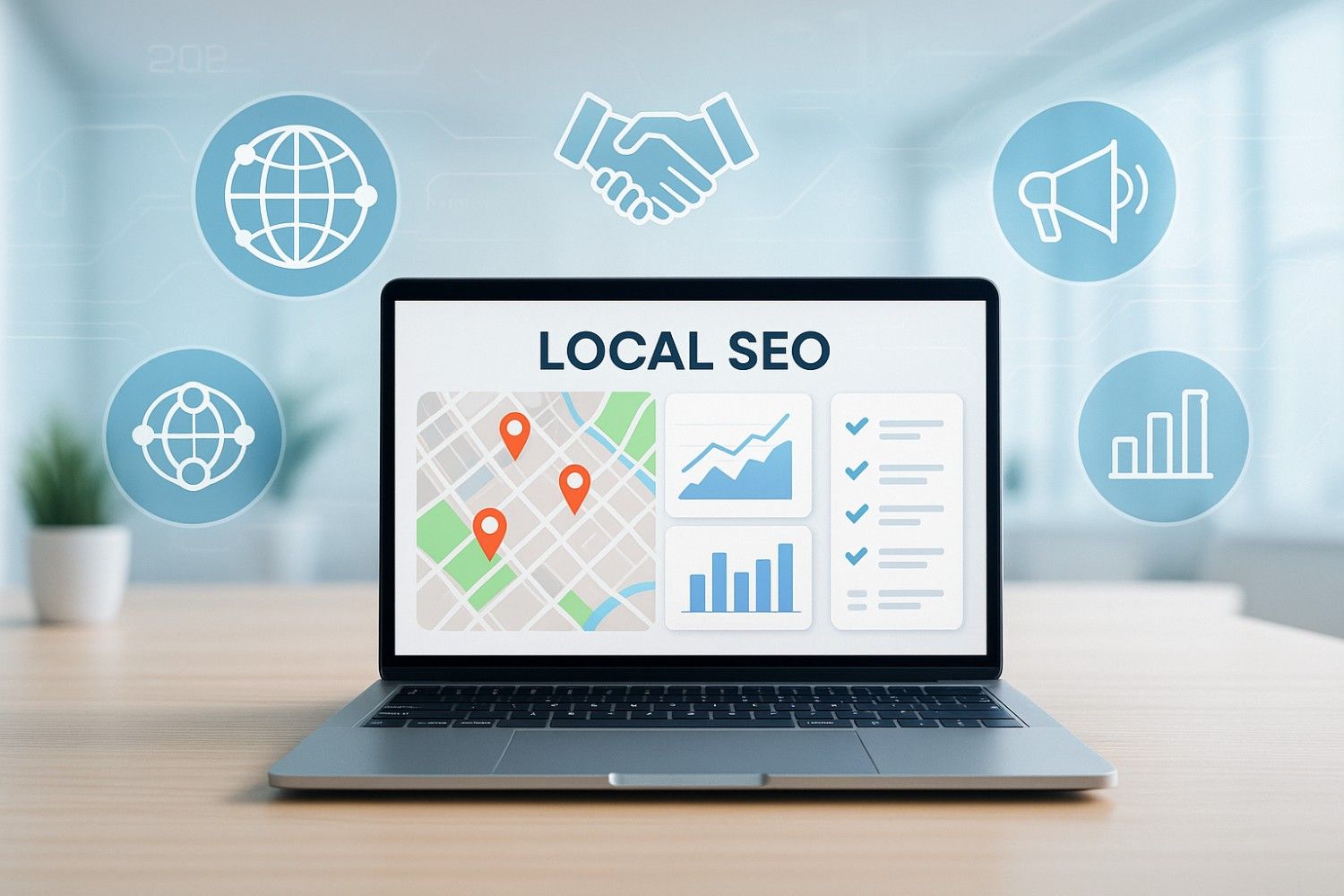The digital world has change business operations, making SEO a critical tool for startup growth. But should you build an in-house team or outsource to an agency? Both options have pros and cons, and the right choice depends on your startup’s needs and goals.
This guide will help you understand the ins and outs of in-house and outsourced SEO, providing insights into which option might be the best fit for your business.
Basics of SEO for Startups
Before we get into the pros and cons, it’s essential to define what these terms mean.
In-house SEO involves hiring employees who are part of your organization to handle SEO tasks exclusively for your business. This can range from a single SEO specialist to a full-fledged team managing technical SEO, on-page content, and link-building.
Outsourced SEO involves partnering with external agencies or freelance experts to manage your SEO efforts. The external team comes with pre-existing knowledge, tools, and methodologies to implement strategies based on your requirements.
Both approaches aim to boost your website’s visibility, drive traffic, and improve your search engine rankings, but their paths to these outcomes differ significantly.
Comparison Table for In-House vs Outsourced SEO
| Feature | In-House SEO | Outsourced SEO |
|---|---|---|
| Cost | Requires salaries, tools, and training expenses. | Offers flexible payment options, often lower upfront costs. |
| Expertise | Limited to the skill level of the team hired. | Access to a team of diverse and specialized professionals. |
| Scalability | Scaling requires hiring and training additional staff. | Easily scalable based on project needs. |
| Control | Full control over strategies and processes. | Limited control as strategies are managed externally. |
| Time to Results | May require more time to build expertise and implement strategies. | Leverages existing expertise for faster results. |
| Industry Insight | Offers tailored insights into the company’s niche. | External agencies often bring broad industry experience. |
| Flexibility | Less flexibility due to being tied to internal resources. | High flexibility to adjust efforts as required. |
The Pros and Cons of In-House SEO
What is in-house SEO?
An in-house SEO team is a group of professionals working exclusively within your organization to focus on achieving your SEO objectives. Unlike agencies or freelancers, in-house teams are part of your company and are directly aligned with your business goals. They typically report to your marketing or digital department and are deeply integrated into your workflows.
Pros of in-house SEO
Full control over SEO strategy: With an in-house team, you own and manage the entire SEO process. This means quicker decision-making and the ability to instantly implement strategies tailored to your startup’s evolving needs. There’s no need to wait for external agencies, which can be bogged down by multiple clients or conflicting priorities. You can pivot strategies on the fly and make real-time adjustments to stay ahead of competitors.
Deep understanding of your brand: In-house employees are immersed in your company culture, giving them unparalleled insights into your brand, audience, and products. They understand your tone of voice, business values, and unique selling points, ensuring your SEO strategies align seamlessly with your overall business goals. This also allows for personalized content and keyword strategies that truly reflect your brand identity, helping to build trust and authenticity with your audience.
Easy collaboration: Being part of your organization means your in-house SEO team can work closely with other departments like development, design, and marketing. They can easily integrate SEO-friendly practices into website development, optimize content for search engines, and ensure campaigns are fully aligned across all channels. This open communication reduces silos and allows for faster execution of strategies, making the entire process more efficient and productive.
Focused attention: An in-house SEO specialist dedicates 100% of their time and effort to improving your website’s performance. Unlike agencies, who juggle multiple clients, your in-house team is solely focused on your business. This ensures continuous monitoring, proactive problem-solving, and regular updates to keep your site optimized. They can stay on top of trends, analyze performance, and iterate quickly to deliver consistent results.
By investing in an in-house SEO team, businesses gain more control, better alignment with their goals, and the ability to react quickly in the ever-changing SEO landscape. While it requires upfront resources, the long-term benefits often outweigh the costs, making it an attractive option for companies looking to drive sustainable growth through organic search.
Cons of in-house SEO
High upfront costs: Building an in-house team requires significant investment. Costs include salaries, benefits, training, and the premium SEO tools necessary for effective work. For instance, hiring an SEO specialist may start at around $40,000 per year, excluding other operational expenses.
Time-consuming recruitment: Finding the right talent can take months, especially for specialized roles like technical SEOs, content marketers, and link-building experts. These positions are often in high demand, making it even harder to secure top talent. The hiring process can be slow, requiring extensive time to screen resumes, conduct interviews, and assess candidates’ capabilities.
Limited skill diversity: While your team may excel in certain aspects of digital marketing, they may lack expertise in others, such as advanced SEO techniques, data analysis, or outreach strategies. This can create knowledge gaps that limit your ability to execute well-rounded campaigns. Relying on a small pool of skills may also hinder innovation and the ability to adapt to industry trends.
Challenges in scalability: Scaling your marketing efforts or taking on larger projects can overwhelm a small, internal team, especially if resources are limited. Tight budgets and time constraints can make it difficult to meet growing demands, leading to burnout or missed opportunities. Without the right infrastructure or support, scaling effectively becomes a significant challenge.
Cost analysis of in-house SEO
Building an in-house SEO team comes with significant costs. Here’s what you can expect to spend:
- $40,000/year or more for a single SEO specialist, depending on their experience and expertise. Hiring multiple specialists, such as a strategist, content writer, or technical expert, can quickly increase this expense.
- $1,200+/year on essential SEO tools like keyword research platforms, analytics software, and content optimization tools. Some advanced tools or premium versions could add even more to your budget.
These costs can add up, so it’s important to weigh the potential return on investment when deciding if an in-house SEO team is the right choice for your business.
While these costs may seem steep, they can pay off in the long run, as your team’s expertise grows and adjustments to your SEO strategy become more agile.
The Pros and Cons of Outsourced SEO
What is outsourced SEO?
Outsourced SEO involves hiring an external agency or consultant with expertise in managing SEO for a wide variety of businesses. These agencies provide an all-in-one solution, handling everything from on-page optimization to analytics reporting.
Pros of outsourced SEO
Access to expertise: Agencies have highly skilled teams with robust experience in different aspects of SEO, such as technical SEO, content marketing, and more. You can leverage their experience for quicker and more effective results.
Cost-efficient for small startups: Compared to the fixed costs of building an in-house team, outsourcing allows you to pay for only the services you need. Packages start at approximately $2,500/month, making it more flexible for startups on a budget.
Faster implementation: Industry experts can execute strategies more efficiently, reducing the time it takes to see tangible results.
Scalability and resources: Outsourced partners often have larger teams and access to advanced tools, making it easy to scale your efforts as your business grows.
Cons of outsourced SEO
Limited brand understanding: External agencies may not fully grasp the nuances of your startup’s brand, audience, and goals. Achieving alignment can take time and effort.
Lower control over processes: Since the team isn’t under your direct supervision, you may have less control over specific aspects of the strategy.
Potential for miscommunication: Relying on remote communication can sometimes create delays or misunderstandings.
Commitment requirements: Most agencies require long-term contracts, typically ranging from 3–6 months, which may be challenging for startups with short-term goals.
Cost analysis of outsourced SEO
On average, you can expect the following costs:
- Monthly retainers: $2,500–$7,500
- Hourly rates: $50–$100
- Project-based fees range from $1,000–$5,000.
These costs often include bundled benefits like ongoing analytics, expert recommendations, and access to premium SEO tools.
Cost Comparison
| Expense Type | In-House SEO (Estimated) | Outsourced SEO (Estimated) |
|---|---|---|
| Salaries | $50,000 – $100,000/year per specialist | $1,500 – $10,000/month depending on services |
| Tools/Software | $500 – $1,000/month | Often included in the agency fee |
| Training | $2,000 – $5,000/year | Typically handled by the agency |
By reviewing the differences presented above, businesses can better decide which SEO strategy aligns most effectively with their goals, budget, and operational needs.
Key SEO Considerations for Startups
To make the best decision for your startup, consider the following factors:
1. Budget constraints
If you have a tight budget, outsourcing may provide a more affordable entry point. However, if you’re focused on long-term results and willing to invest upfront, building an internal team could be worthwhile.
2. Team size and expertise
Do you already have knowledgeable staff in marketing or tech? If yes, an in-house team may build on this foundation. If not, outsourcing ensures immediate access to experienced professionals.
3. Scalability
For startups expecting rapid growth, outsourcing offers flexibility and scalability without the need to hire additional staff.
4. Long-term goals
If you’re looking for a tailored approach closely aligned with your company’s unique vision, in-house may be the way to go. For short-term results or a trial with SEO, outsourced solutions can meet your immediate needs.
Making the Right Decision for Your Startup
Here’s a detailed guide to choosing the best option for your SEO strategy:
Define your SEO goals: Start by clarifying what you want to achieve with SEO. Are you focusing on building brand awareness, increasing website traffic, generating leads, or driving more sales? Having clear goals will help you determine the best approach and measure success accurately.
Assess your current resources: Take a close look at the resources you already have. Do you have the talent, tools, and expertise in-house to handle SEO effectively? Or would it require hiring and training new staff? Consider the time and effort that managing an in-house team would demand versus outsourcing to experts.
Analyze cost-effectiveness: Compare the costs of building an in-house team versus hiring an agency or freelancer. Think about long-term expenses like salaries, training, tools, and software. Then weigh these against the potential return on investment (ROI) for each option. Don’t just focus on the upfront costs consider the value of expertise and efficiency as well.
Start small if needed: If you’re unsure about committing to a full plan, begin by outsourcing smaller tasks. For example, you might hire an agency or freelancer to handle keyword research, website audits, or content creation. This allows you to test their expertise and efficiency without a major investment. You can scale up once you’re confident in their performance.
Evaluate communication preferences: Think about how you prefer to work. Do you value close collaboration and hands-on control, which might suit an in-house team? Or would you benefit from outsourcing to an agency with specialized expertise and independent workflows? Clear communication is essential for success, so choose the setup that aligns best with your style and business needs.
Final Thoughts
In-house and outsourced SEO strategies each have their advantages, and the right choice depends on your startup’s goals, resources, and challenges. If you value control and brand expertise, an in-house team might be best. If you need scalability and quick expertise, outsourcing offers the flexibility you need.
What matters most is choosing a strategy that supports your long-term growth.




